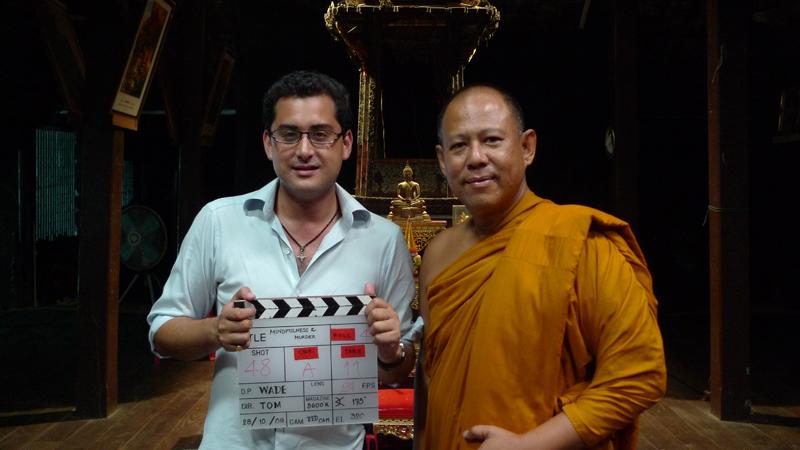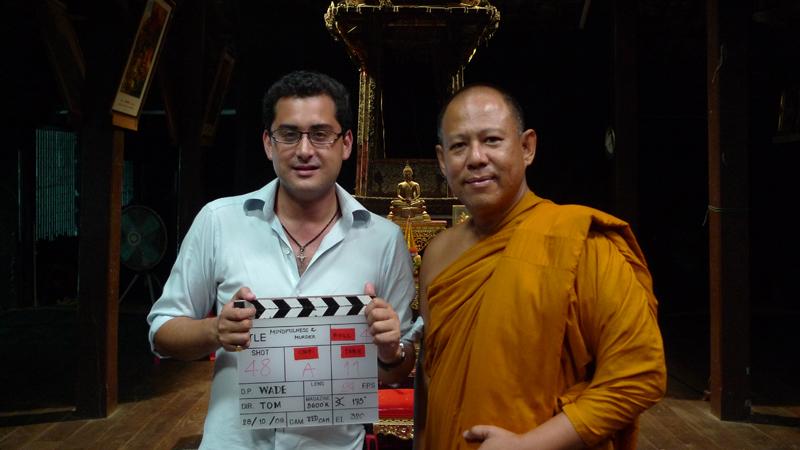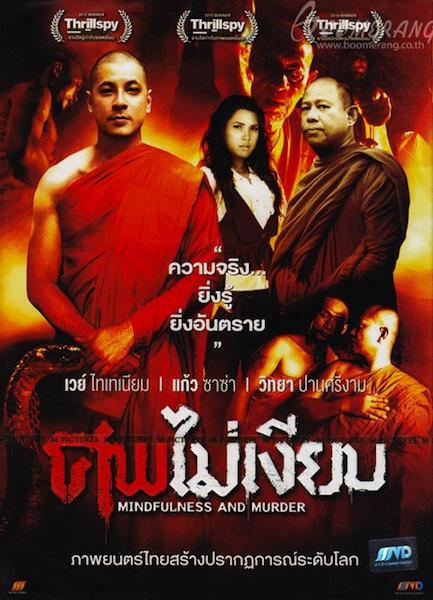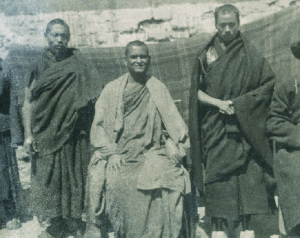Mindfulness and Murder, a Thai film by director Tom Waller, is one of a kind and will no doubt be a surprise to Buddhists and non-Buddhists alike. The film opens with the mindful words of the Buddha:
“neither fire nor wind, birth nor death, can erase our good deeds”
and follows with the sounds of birds awakening to the dawn of a new day. The shot is incredibly peaceful, as we follow a monk dressed in tanned robes climbing up a tower to ring the bell, announcing the beginning of yet another mindful day in the monastery. Or so we think.
Immediately after this first scene, the film plunges into action as two murdered bodies are found, one of which is in the monastery itself. As if this isn’t strange enough, we soon realize that the only hope of solving the case lies with a monk who happens to be a former homicide investigator – not exactly your average detective hero. And the plot continues to thicken, for it is not long before a whole criminal underworld is revealed within the monastery, ripe with drug dealings and sexual deviances. Everyone is a suspect, be it the police, the monks or the Abbot himself.
What a surprise to a viewer like myself, so used to associating the monastery to a peaceful sanctuary in which all the monks are far nobler than the average layman. Throughout the film, there was one main question running through my head: Why set a murder in a holy environment and blend two topics that usually seem so separate? It is easy to understand the ‘murder’ part of the film. As a contemporary audience, we are prone to liking fast paced movies that are filled with mystery, corruption and crime. And
this film will certainly be pleasing to such movie-goers, for it is filled with suspense and very entertaining. In this sense, the director is certainly choosing a commercially viable topic.
But why associate it to Buddhism, or in other words, where does the ‘mindfulness’ part come in? Well, after having let the film sink in for a few days, I am beginning to see a bigger purpose than pure entertainment and shock value. To a Buddhist viewer, it may serve as a warning: not to let labels and titles misguide us, a message that the Buddha himself was often reminding his followers. Policemen, monks and Abbots are just as prone to the poisonous roots of ignorance, craving and aversion. Wearing a uniform, or wearing a robe and living in a monastery does not automatically make someone a wise and noble being, and such people must be careful not to abuse their power and lose sense of their wholesome purpose.
As the first lines of the film tell us, nothing is stronger than our good deeds. This is perhaps best embodied by Brother Ananda, the detective monk who insists on getting to the bottom of the case and who wants to clean the monastery of its corruption. Watching him through the film, we are reminded about inner peace, as he takes the time to sit and breathe with his eyes closed, or to observe mindfully what is going on around him. And the many suspended shots of the monastery and its beautiful rituals are certainly a reminder of what is pure and beautiful in Buddhism, and makes the message all the more clear when many of the characters are acting against these ideals.
Mindfulness and Murder certainly has the potential to reach a wide audience due to its unusual and yet highly entertaining plot, its interesting characters and beautiful shots. My only complaint is the end of the film, which seems to come to a quick and unsatisfying resolve. Indeed, whilst it moves along at a somewhat fast but enjoyable pace, it suddenly seems to come to a halt leaving many questions unanswered that probably should have been. Nevertheless, it is well worth a watch, and will certainly get Buddhists and non-Buddhists thinking about what it means to be a good human being.
















